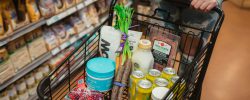The past two years have proven the resiliency of the bev alc industry. Amid a global pandemic and sweeping changes in consumer habits, the sector has readily adapted to shifting market trends. Some might even say it has flourished.
For a historically unchanged industry — one that’s remained largely the same since prohibition — the last few years alone have seen remarkable transformations. From e-commerce becoming a lawful reality to the rise of no- and low-alcohol adult beverages, the industry as we know it is evolving.
Here are some of the leading trends that will shape how we drink in 2022 and beyond.
Premiumization
In a trend that’s been gaining momentum for the past 20 years, due to a variety of contributing factors (increasing societal wealth, more product offerings, and a deeper appreciation among consumers for the products themselves), premiumization is here to stay. If we learned anything from the pandemic quarantine, it’s that consumers rallied behind the idea of purchasing premium products to enjoy at home – money that otherwise would have been spent on overpriced alcohol by the glass on premise.
Also contributing to the premiumization trend is customer curiosity. Consumers are more intrigued today than they were years ago and are eager to learn about (and explore) different products within categories of interest.
No- and low-alcohol category continues to dominate
No- and low-alc drinks are not just for people ‘on the wagon.’ Many of those who overindulged in the early months of the pandemic found themselves seeking moderation and healthier alternatives. According to IWSR, 58 percent of no- and low-alcohol consumers still drink, but in moderation. No- and low-alc sales increased 33 percent to $331 million in 2021, according to Neilsen. IWSR predicts that the non-alc spirits category is expected to grow 35 percent by 2023.
For those looking to ‘drink healthier,’ there are options. One standout brand in the space, Ritual Zero Proof, offers spirit alternatives. The company’s name is a nod to the daily “ritual” of making, shaking, and pouring your evening cocktail, which often signifies the end of the workday. Spiritless makes Kentucky 74, a Bourbon substitute. Lyres offers a range of non-alcoholic craft spirits and liqueurs. On the beer side, Athletic Brewing Company and Partake Brewing are both great options with a variety of beer styles.
Brands will continue to experiment with e-commerce/DTC
With e-commerce becoming more mainstream, increasing by more than 40 percent across 16 key markets in 2020, according to IWSR, the alcohol industry is finally adopting a more modern approach to connecting with its consumers. Alcohol purchase is now accessible online with platforms like Speakeasy and Thirstie assisting brands to build e-commerce solutions on their websites so products are legally packaged and shipped.
Hiring priorities have shifted
As a result, from a hiring perspective, bev alc e-commerce roles are soaring and have never been more in demand. Many companies are seeking talent from legacy DTC giants like Warby Parker and Casper, as well as food and non-alcoholic beverage companies that have been selling online for years. From Social Media Strategists to Digital Marketing Managers, positions in digital marketing are soaring.
So, where is the talent coming from?
Many employees from food and non-alc beverage companies are quite literally spilling over into the no- to low-alc beverage sector. And they’re bringing their relationships and specialized knowledge with them. From our unique vantage point in the world of beverage recruiting, we’re seeing that there’s a healthy crossover of talent across all levels from non-alc into the dynamic bev alc industry. An example of this is Partake Brewing’s distribution with traditional beer wholesalers. Some talent from alc beer is making the move to this quickly growing category because of their abilities to maintain the image of “real beer” and their keen understanding of what beer drinkers want.
The good news for job seekers is that they’re in the driver’s seat of this candidate-driven market. For employers, that means they must step up when it comes to offering what job seekers value most right now: higher compensation, flexible schedules, and meaningful work.
This year is shaping up to be a defining one for the bev alc space. How companies adapt to the drastic changes of the past two years will be instrumental in defining their long-term success in the post-pandemic world.






